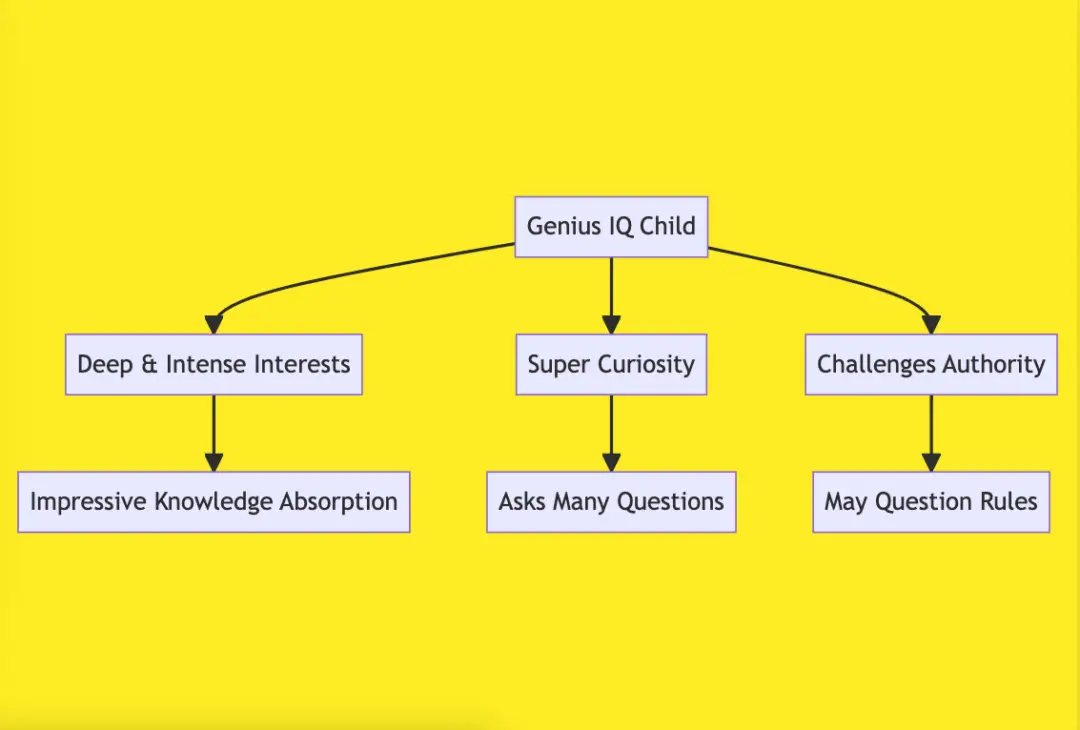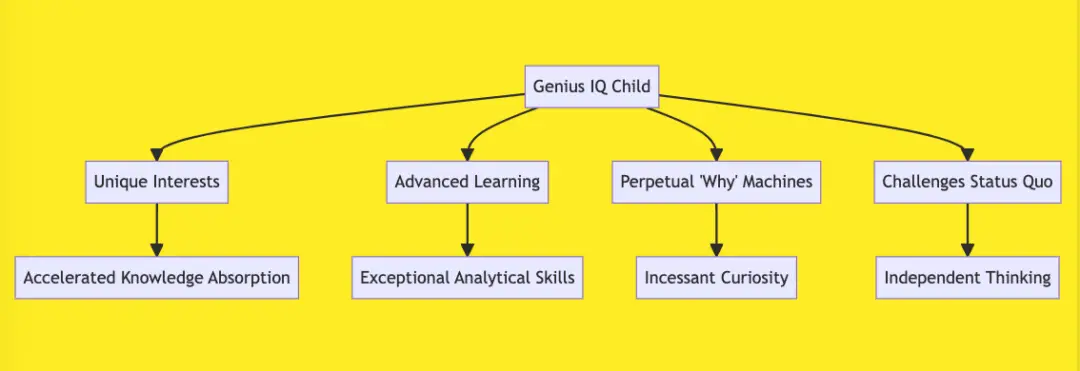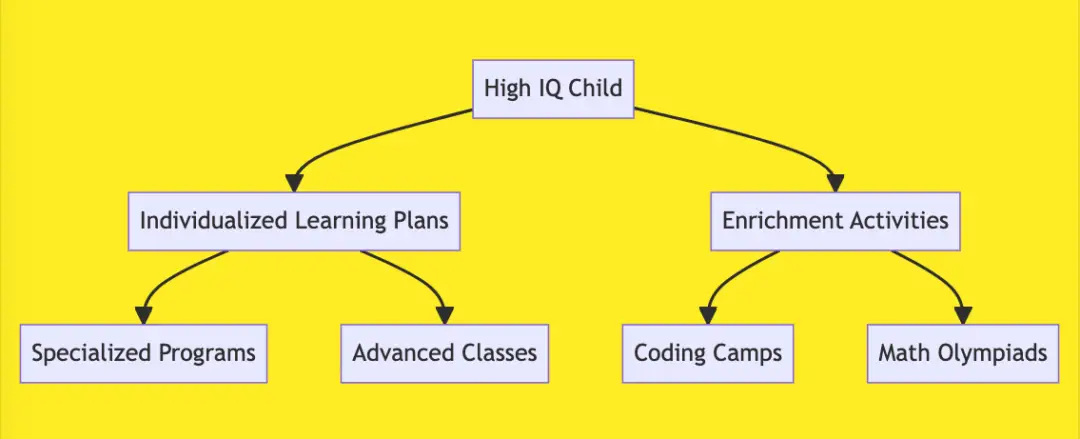Brace yourselves as we dive into the fascinating world of child prodigies, savants, and intellects that defy normal standards. If you’ve ever pondered, “What is considered a genius IQ for a child?” you’re in the right place. We’re about to unpack everything you need to know.
An IQ score over 140 is generally considered to indicate a genius level of intellect in children. This range, however, may vary slightly among different IQ tests and their respective scoring systems.
But don’t be quick to click away! There’s more to this story than a mere number. The landscape of genius is as broad and varied as the human intellect itself. By venturing further, you’ll encounter eye-opening insights into how genius manifests in children and how it can be nurtured to help them reach their full potential.
Understanding the Genius IQ: What Does It Mean for a Child?
Let’s cut to the chase. A child is considered to have a genius-level IQ if they score over 140 on a properly administered IQ test. Yet, what does this mean in real-life scenarios? Does it mean your child will start inventing groundbreaking theories or penning novels? Well, not necessarily. Here’s what you need to know:
Genius IQ levels in children, often known as “Highly Gifted” or “Profoundly Gifted”, can display an impressive capacity for abstract thought, rapid learning, and keen problem-solving skills. Remember, though, that an IQ score is just a number. It’s an indicator, sure, but it’s not the end-all and be-all of your child’s potential.
Beyond the Numbers: What Does a Genius IQ for a Child Look Like in Practice?
So, your child has been tested and the results say they have a genius-level IQ. You might be wondering, “What does that mean day-to-day?” Here’s the low-down:
Kids with genius IQs often show a few common characteristics. They may have deep, intense interests in specific topics and can absorb information like a sponge. They’re often super curious, questioning everything, and they may even challenge authority if they see things differently.
Remember the old phrase “age is just a number”? Well, in this case, “IQ is just a number” rings true. Having a high IQ doesn’t mean your child will be happy, successful, or well-adjusted. What matters is how you nurture their gifts and help them grow into well-rounded individuals.

Nurturing the Genius: How to Support a Child with a High IQ
You’re on board the genius train now, so it’s vital to know how to support your bright spark. Here are a few tips:
- Feed their curiosity: Encourage their interests, even if they seem intense or unusual. Libraries, museums, documentaries – these are your new best friends!
- Provide intellectual challenges: Simple puzzles? Nah, they’ll breeze through them. Keep their minds engaged with more complex tasks.
- Teach social skills: A high IQ won’t automatically grant your child social prowess. They may need help navigating social situations and forming friendships.
In the end, whether your child has a genius IQ or not, what matters most is that they’re supported, loved, and encouraged to be the best they can be. After all, their IQ is just one aspect of who they are. It’s the whole child that truly counts.
The beauty of having a high IQ is not just about being smarter. It’s about viewing the world from a unique perspective and using that view to make a difference. It’s about passion, creativity, and the audacity to think outside the box. So let’s celebrate the genius in every child, because, in their own way, every child is a genius.
Beyond the Numbers: What Does a Genius IQ for a Child Look Like in Practice?
So, you’ve got the gist of what a genius IQ score is. Now, let’s dive a bit deeper and uncover what it truly means in the day-to-day life of a child. After all, an IQ score is more than just a number, right?
Unique Interests and Advanced Learning
First off, children with a genius-level IQ often exhibit incredibly unique and intense interests. These are no run-of-the-mill hobbies. We’re talking about six-year-olds fascinated by quantum physics or eight-year-olds engrossed in classical literature. To say they’re inquisitive would be an understatement.
But it’s not just about the ‘what’; it’s also about the ‘how’. They don’t just learn; they absorb knowledge at a remarkable rate, often outpacing their peers and even older children. It’s as if their brains are supercharged, ready to take in information at warp speed.
Asking ‘Why’, Then Figuring It Out
Next, children with a genius IQ are typically perpetual ‘why’ machines. They possess an insatiable curiosity, constantly questioning the world around them. And it doesn’t stop at asking. Their analytical minds often come up with theories and explanations that are incredibly advanced for their age. It’s a constant cycle of asking, learning, and analyzing, which keeps their minds perpetually engaged.
Not Afraid to Challenge the Status Quo
But it’s not all smooth sailing. These children are often very independent thinkers, unafraid to challenge authority or question societal norms. You’ll often find them asking ‘Why not?’ when they’re told something can’t be done. And if they think they’re right, it can take quite a bit of convincing to change their minds.

The Balancing Act: IQ and EQ
Now, it’s important to remember that a genius IQ doesn’t automatically translate to success in every field. A child with a high IQ might excel academically but struggle socially or emotionally. This is why it’s crucial to balance their intellectual growth with emotional development. After all, empathy, resilience, and communication skills are just as important as book smarts, if not more.
In a nutshell, having a genius IQ is not just about acing tests or solving complex puzzles. It’s about a unique way of interacting with the world around them. It’s a blend of curiosity, creativity, and sometimes, a bit of rebellion. So, when you ask, “What does a genius IQ look like in a child?”, remember, it’s more than just a number. It’s a fascinating journey of learning and discovery. And every journey is unique.
Nurturing the Genius: How to Support a Child with a High IQ
Do you find yourself raising an exceptionally bright kiddo? Wondering how to navigate this unique parenting journey? No need to fret! Supporting a child with a high IQ isn’t about pushing them to their limits. It’s about providing the right environment for their intellect to thrive. And trust me, with a bit of guidance, you’ve got this!
Meeting Their Unique Learning Needs
Children with genius IQ often need an education that’s as unique as they are. Traditional classrooms might not cut it, as these kids usually learn at a faster pace. Hence, individualized learning plans are key. Whether it’s homeschooling, specialized programs, or advanced classes, find an education path that matches their learning speed and style.
It’s also worth exploring enrichment activities outside the classroom. Think about workshops, clubs, or competitions that align with their interests. From coding camps to math olympiads, the options are endless. Just remember to let their passion guide the way.

Emotional Support and Peer Interaction
However, it’s not all about academics. A high IQ can sometimes feel isolating for kids. They might struggle to connect with peers their age, leading to feelings of loneliness. Thus, fostering emotional resilience is crucial. Be there for them. Let them know it’s okay to be different. Encourage them to express their feelings and remind them that they’re not alone.
At the same time, try to facilitate interaction with like-minded peers. This could be through gifted programs, online forums, or social events for gifted children. Such platforms can help them build friendships with kids who understand their unique experiences.
Encouraging Independence and Creativity
Finally, remember that a high IQ doesn’t strip away a child’s need for independence and creativity. So, let them explore, make mistakes, and learn. Nurture their creative side, whether it’s painting, inventing, or even storytelling. And while you’re at it, remember to encourage their inquisitive spirit. Answer their questions, but more importantly, teach them how to find answers on their own.
In the end, nurturing a child with a high IQ is a journey of love, patience, and understanding. It’s about providing the right tools, opportunities, and emotional support to help them navigate their unique path. And remember, every child is different. So, let your child’s interests, strengths, and passions guide your way.
